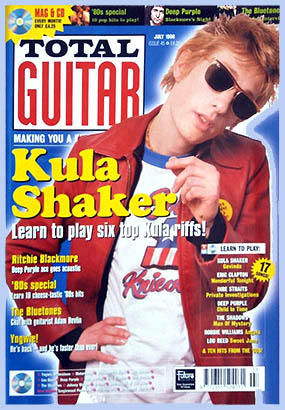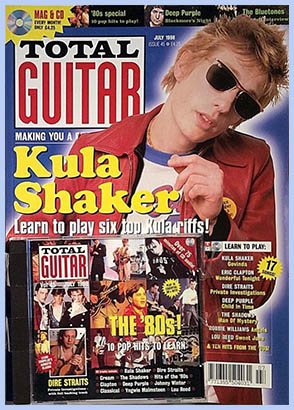|
Ritchie Blackmore Deep Purple Ace Goes Acoustic  Why did you decide to release "Shadow of The Moon"?
Why did you decide to release "Shadow of The Moon"?Musically, this is the best album I've ever worked on. I've been interested in Renaissance music for 30 years, but I've never played it. For the last ten years I started playing it at home, Candice joined me, and that's how it started. We quickly found material for the album, although I never thought I would play it. However, we remained receptive and compromised quite a bit. We want to open the door to those who are not very familiar with Renaissance music. It seems to me that this music comes from the heart, and not from the head for financial gain. This is what I want to do. I was so used to going into the studio with hard rock and recording riffs with harmonies, but I never listened to the end result because it came out completely different from how I originally imagined it. It took me a long time to allow myself to say, "Okay, I'm going to do what I love instead of playing for managers and promoters. There is a very interesting composition "Mond Tanz" on the album. What inspired you to write it? Observing a group of gypsies who gathered to dance to a drum in a field near my house on the day of the summer solstice, when there was a full moon. There are a lot of excellent instrumental compositions on this disc. Do you want to release an instrumental album? I never perceived myself as a guitarist who should release guitar albums. If I don't have anything to say, and if I have a good singer, I'm not very interested in recording just instrumentals, so I stay away from that. I really think the singer is very important; without it, the band will sound like an orchestra without the main violin. I love instrumental songs, but I'm not interested in listening to them all the time. When did you start playing guitar? It all started when I heard Tommy Steele at age 11, and then I moved on to Hank and the Shadows, then to Duane Eddie, Buddy Holly, Les Paul and Chet Atkins. I was inspired by Jimi Hendrix, not just his guitar playing, but the way he wrote songs with heavy riffs and the way he improvised. Why did you quit classical guitar lessons? Because I learned everything too slowly. When did you start composing music? I started writing music after hearing The Who play "I Can't Explain", I realized that I wanted to do this. First I started coming up with riffs, then harmonies, and now I also write melodies. In 1993 you left Deep Purple. What was this connected with? It was all too false and pompous for me, but they're a great band, they're good musicians, it's great that they keep playing because when I left they thought it was the end and I kept saying, 'Why don't you just find another guitarist and continue playing?" It seemed to me that we parted as friends. From then on everything went downhill and they started making all sorts of statements, I don't know why. I'm on bad terms with Gillan, but we're on pretty good terms with the others. Without Purple, I would never be able to do what I do now. We recorded a lot of good music on the albums "In Rock", "Machine Head" and "Burn". Many people think that I can't stand this music; but it doesn't disgust me at all. I heard it on the radio recently and it sounds great. But you need to develop and do something new. What do you think about Yngwie Malmsteen? People often ask me: "What do you think about Yngwie?" I think he's an incredible guitar player. I think everyone expects me to say he's a terrible player or something like that, but that's not true. He doesn't seem to be shy about admitting that I influence him, but sometimes he imitates me too much and it seems a little weird to me. How do you feel when you hear that someone is imitating you?  Oddly enough, I heard something like that on the radio the other day. I thought it was me playing and I thought, "Who the hell is this?" It turned out that it was Joe Satriani. I would never have believed that this guy would play so much like me. When I bought "Surfing With The Alien," I listened to side one and thought, "Wow, this guy is playing really well," but when I started listening to side two, I started missing something.
Oddly enough, I heard something like that on the radio the other day. I thought it was me playing and I thought, "Who the hell is this?" It turned out that it was Joe Satriani. I would never have believed that this guy would play so much like me. When I bought "Surfing With The Alien," I listened to side one and thought, "Wow, this guy is playing really well," but when I started listening to side two, I started missing something.He plays with incredible technique, but something is missing there. Maybe he plays too technically and too fast. Believe it or not, I stopped playing fast when I was 17 because all I cared about was speed and nothing else mattered until a few people said to me, "You know, I think you should play slower." Since then I started playing slower! What instruments do you use in Blackmore's Night? In Blackmore's Night I play acoustic guitars; Alvarez, Taylor and Lakewood, I usually record the sound through a microphone, sometimes I connect it to a Crate amp, although for heavy things I use Engl. Playing this kind of music at concerts is not easy. We're probably the quietest band in the world right now. It must be very difficult for purists like John Williams to play in a way that sounds on par with the orchestra. He's great, he must be practicing 20 hours a day. In Renaissance you often have to stick to structure. You can't just improvise. This is very difficult for me. The worst thing about playing guitar for me is learning melodies and playing them exactly. But in this material you have to play like that. There is no room for improvisation, as in rock and roll or blues, all the music is written in strict minor modes, it has a very precise and strict structure. When it works out, it is very pleasant, it is refreshing and gives a feeling of satisfaction. But it's a hassle, especially when you have to go out to the audience and play so quietly. I used to go on stage and hit guitars, screaming loudly with my fist in the air. But here everything is completely different; It's like I'm appearing on stage naked. But yes, you can get used to performing naked. I still have room for another Rainbow project, maybe next year, but at the moment I'm interested in this music. I was starting to get tired of putting new rock 'n' roll albums on the pipeline, so I decided I should take a little break and I'm very happy playing this music. Total Guitar Magazine - July 1998 |